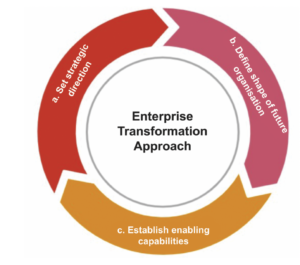Transformation expectation: A prime time

The pandemic has presented the perfect opportunity to embed a culture of transformation, which is responsive to customer needs, writes PwC’s Director of National Government Services, Conor McColgan.
There’s always a choice. Either we do, or we don’t. But there’ll never be a time to get it right like we have now. I’m talking about the juncture at which we find ourselves, and by ‘we’ I mean all of our communities in Northern Ireland.
When I think about it, I picture a burning platform. We could stick where we are and hope for the best or we could grasp the seriousness of the situation and take action. Not reforming risks underdelivering to the general public.
Let’s be clear, transformation is no longer a choice. The public expects us to change, they’ve become more digitally-savvy, and expect to be able to interact with public services in the same way they do with banks, their friends and family and so on. The question is: Why wouldn’t we do it now? We have the perfect foundations, the need for transformation, the appetite for change and the resources. When the Chancellor announced an extra £1.6 billion for Northern Ireland’s public sector in his Autumn Statement he was handing us the chance to think differently, to opt for more radical choices.
And the mindsets and behaviours of people as we recover from the pandemic provides a further opportunity. We are in a wholly different environment from the one we were in two years ago: the world of work is evolving with organisations adapting to hybrid working and flexible approaches; and innovative opportunities are being created by the post-Covid-19 build-back with a focus on a green recovery. To seize the spoils, we need to develop new skills and create an agile workforce that is supported in ways never done before.
We need to deliver more for less, driving automation and repurposing resources for the more value-adding activities that deliver for the public.
As we emerge from the pandemic, we know that we can handle tremendous change. As a client of ours summed up recently: “Before Covid, people could believe tech wouldn’t make things easier. But because of Covid and the lockdowns, people had to find different ways to manage their everyday needs, in the ways we work and socialise even. So, people who would have been the most resistant to increasing the role of tech in their professional lives are now using it in their personal lives and that has been a major shift.”
Let’s clear one thing up. Technology is the golden thread that connects all of this. But, in and of itself, it is not the answer. It is an enabler. It is what you do with it that matters. Technology, existing and new, feeds into your strategy and enables your team to deliver the goals that are set out at the beginning of the journey.
We should learn from others who have been successful with large-scale transformations. For example, over the last few years the HM Courts and Tribunals Service (HMCTS) in England and Wales has embarked on one of the most ambitious digital transformation projects in the UK government, which has broken new ground globally in justice. The vision was to modernise and upgrade the system so that it works better for everyone, from judges and legal professionals to witnesses, litigants and the vulnerable victims of crime. It is costing £1 billon over multiple years, but delivering annual savings of millions.
The scope of the action has been vast, from strategy and planning, designing new customer services, new technology, business architecture, people and cultural transformation, and property portfolio management.
The impact for the public is huge: HMCTS now has online services for appealing immigration and asylum decisions, disputing benefits decisions and for local authorities to apply to take children into care. All of this helps some of the most vulnerable people facing difficult situations get access to justice as quickly as possible and supports litigants who do not have legal representation.
“We need to deliver more for less, driving automation and repurposing resources for the more value-adding activities that deliver for the public.”
HMCTS’s single justice procedure deals with simple, non-imprisonable cases out of court. For anyone pleading guilty to an offence, it means they don’t have to attend court and their case is likely to be dealt with faster and more efficiently. There are many more examples, and of course there are organisational benefits and efficiencies too. There is much that Northern Ireland’s public sector organisations can learn from this venture and from similar examples of public sector transformation globally.
At PwC here’s how we break down the transformation challenge on this scale:
Firstly, set the direction, define the strategy and consider what programmes or projects will help move it forward. From this, you can design the organisation’s future shape, driven by the needs and desired experience of your customers.
Secondly, develop the approach and highlight the phases of the transformation journey. Key to this stage is balancing change with sustaining the operational demands of business-as-usual activities. But you must also keep in mind the importance of bringing staff and customers with you. Clear, consistent and responsive communications must be a part of this plan.
And then finally, plan and implement. Understand that successful transition involves upskilling staff to embrace new roles and responsibilities and supporting them to adopt new technologies and related ways of working. Getting this right is challenging because there is so much to balance, between business as usual activities and helping people to not only see the benefits of the change, but also maintaining a desire to continuously change and improve.
Digitisation is critical and we need to move outdated tech onto the cloud. This will help drive better efficiency through streamlined and automated processes, and make better use of the data that is collected. When we do that, employees, managers and leaders are empowered to draw insights and make decisions based on carefully structured data and accurate information which is securely stored in one place and kept up to date in real-time.
A single source of truth enables agile and rapid decision-making than traditionally enabled by multiple sources. Digitisation will provide tools for improved collaboration and allow a better interface amongst customers, staff and third parties.
So, what’s the prize? We have the opportunity to create organisations that are fit for the future in terms of the services they provide and the skills, structures and technologies that enable these services. Organisations ready to address the changing expectations of the public, focusing resources on delivering the most value to customers and staff. The goal should be to not just deliver a transformation programme or defined set of outcomes, but to embed a culture of transformation and change that looks to drive continual improvement and ongoing adaptation to the ever-changing expectations and demands of the public they serve; not always on a grand scale, but incremental and iterative, seeking opportunities to make a positive impact wherever they exist.
We have a chance to capitalise on the opportunity of the hard-earned learnings of the last 18 months. This is the moment we either do, or we don’t.
Conor McColgan is a Director in PwC’s National Government Services team and specialises in delivering tech enabled transformation in the public sector.
T: 028 9024 5454
E: Conor.McColgan@pwc.com
W: www.pwc.co.uk







